Cooking experts agree that Pakistani cuisine is one of the most flavorful and diverse cuisines in the world. With its rich history, various regional influences, and intense flavors and aromas, it can be difficult to determine which spices are essential for a successful Pakistani dish. In this article, we reveal the ten must-have Pakistani spices that no kitchen should be devoid of.
Pakistani Food
Pakistani food is one of the most beloved cuisines in the world. It shares many similarities with Indian and South Asian food, but its flavors are unique due to its blend of spices, herbs, and ingredients. From spicy curries to savory kebabs, Pakistani dishes offer a wide variety of taste and texture. The flavors of Pakistan are a delectable combination of spices and ingredients that will tantalize the taste buds.
Pakistani food varies greatly from region to region, ranging from mild and creamy curries in the north to fiery blends of chili peppers in the south. The cuisine is a unique blend of traditional cooking techniques and recipes, combined with local herbs and spices, to create some of the most delicious dishes in South Asia. From rich curries to flavorful biryanis, Pakistani food is sure to please everyone at the dinner table.
The use of traditional spices like cumin, coriander, cardamom and turmeric give the dishes their distinct flavor. You can use these spices in combination or individually to create unique combinations that will tantalize your taste buds. Additionally, Pakistani cuisine often features generous portions of yogurt which gives it a creamy texture and richness that many people find comforting. In Pakistani cuisine, another popular component is ghee, a clarified butter used for both cooking and garnishing dishes to add flavor and aroma.
Pakistani Spices
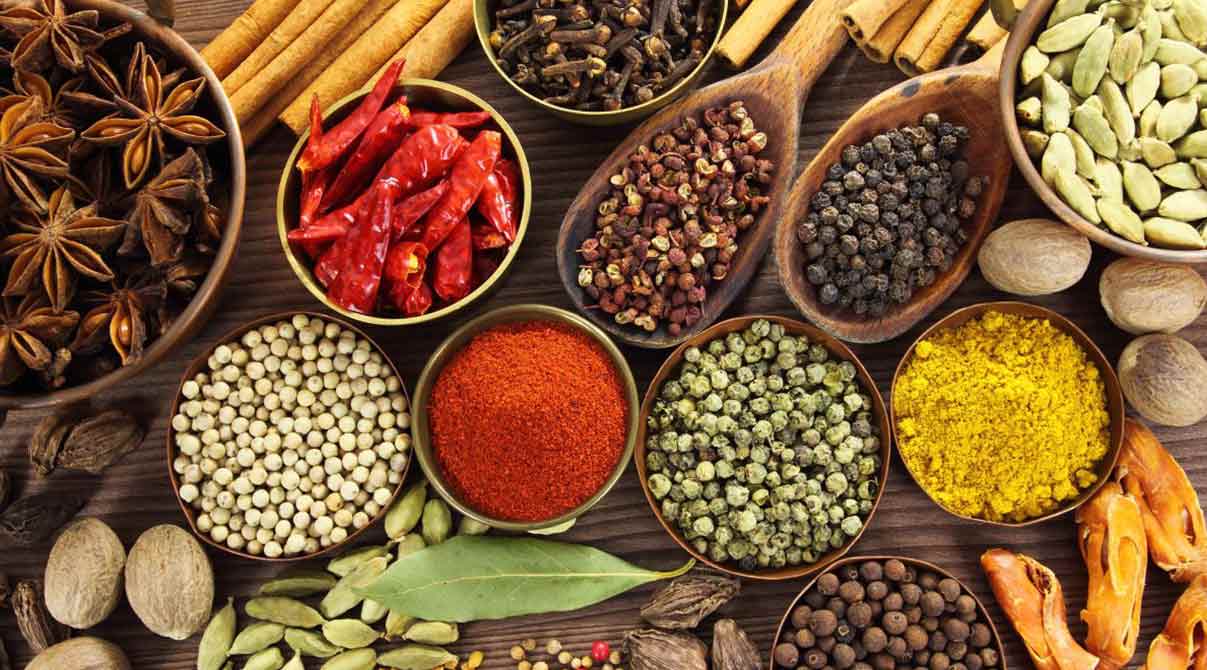
Pakistani cuisine is well-known for its complex flavor combinations and fragrant spices. Whether you’re a novice or experienced cook, the essence of Pakistani cooking comes down to one thing: its spices. From the fiery chili powder to aromatic cumin, these powerful ingredients bring out the unique flavors of each dish. The vibrant colors, unique aromas, and bold flavors of Pakistani spices are a testament to the country’s culturally rich gastronomic history. Used in countless traditional dishes, Pakistani spices bring depth, flavor and an unmistakable warmth to any recipe.
While many cuisines around the world use some of these spices, Pakistani dishes depend on several that are native to this region. Turmeric imparts an earthy yet sweet flavor to curries and pilafs, while garam masala adds a warm complexity to any recipe. Another key ingredient used extensively in savory dishes as well as desserts like kheer is cardamom. Cloves and black pepper add a pungent kick while fennel seeds lend a subtle sweetness that rounds out many recipes.
What are Pakistani Spices?
Pakistani spices are a key component of the country’s culinary culture, imparting flavor and complexity to both traditional recipes and modern interpretations. While some Pakistani spices may be familiar from dishes around the world, others are uniquely regional, lending an unmistakable essence to local cuisine.
Spices encompass everything from whole pods of cardamom to ground cumin and chili powder. Popular ingredients include bay leaves, black pepper, cinnamon sticks, cloves, coriander seed, curry leaves, garlic paste and ginger paste. Spices like mace blade also play a role in many Pakistani dishes as well as a variety of herbs such as mint and parsley. The combination of these ingredients creates unique flavor profiles that add complexity to curries and other cooked dishes.
10 Must-have Pakistani Spices Revealed by Cooking Experts
Cooking experts everywhere agree that the right blend of spices is essential to creating a great dish. While each region has its own unique flavor, Pakistani cuisine is famous for being particularly spicy and flavorful. But what are the must-have Pakistani spices? Cooking experts have revealed their top picks. From cumin to ginger and chili flakes, these flavors will give your dishes a unique taste from the region.
1. Red Chilli Powder
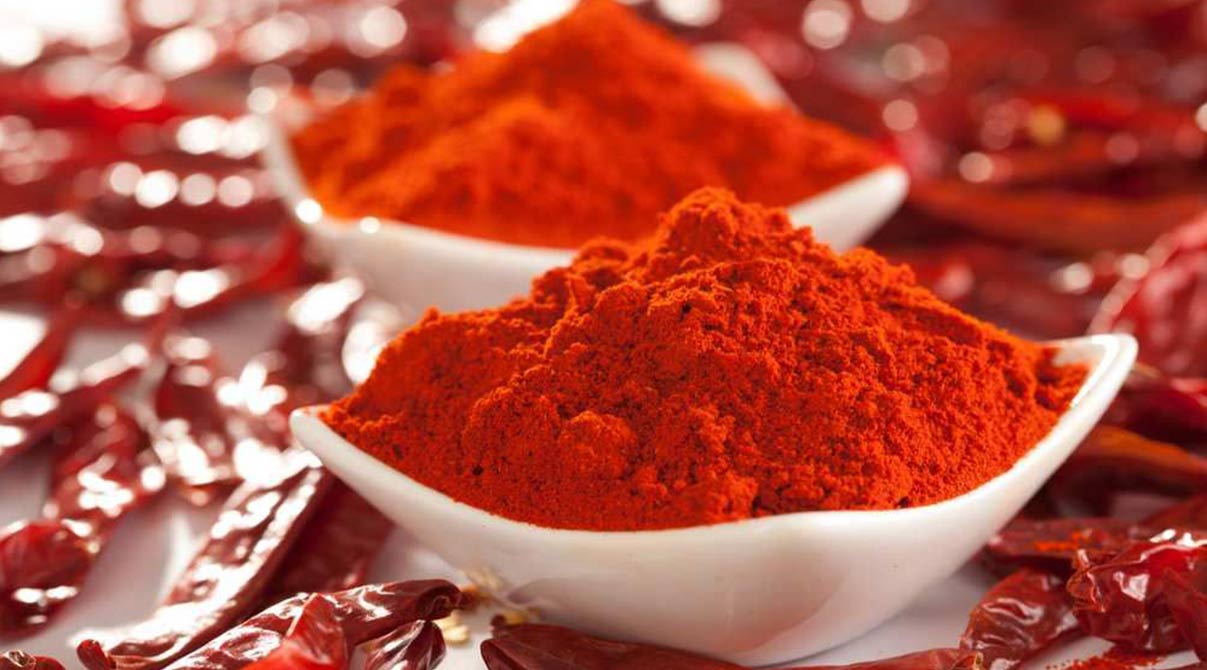
Red chilli powder is a must-have spice in any Pakistani kitchen. This easily available kitchen ingredient adds flavor and aroma to all the delicious dishes. Pakistan’s cooking experts have disclosed their favorite spices, enhancing traditional Pakistani dishes’ deliciousness. The most popular of these spices is red chilli powder as it gives food its signature heat – essential for many authentic recipes. It’s also great for making curries and adding a rich color to any dish. Additionally, you can use red chilli powder to marinate meat or fish before cooking, and you can also add it at the end of cooking to give the dish an extra punch of flavor.
Pakistani cuisine relies on red chilli powder as an essential ingredient to add flavor and heat to various dishes. People have been using it for centuries as part of the regional cooking culture, and it continues to be an integral component of the country’s cuisine today. This vibrant, red-hued spice originates from dried red chillies that have been finely blended into a powder. Red chilli powder prominently features in many meals across Pakistan, especially in dishes from the Punjab province, renowned for its flavorful curries and stews.
Health Benefits of Red Chilli Powder
This aromatic, pungent spice adds more than just heat – it also provides great nutritional value due to its high vitamin A content as well as antioxidants like carotenoids. Red chilli powder offers a variety of health benefits, from aiding weight loss to relieving pain, that we should not overlook.
Capsaicin has strong anti-inflammatory properties which can help reduce swelling and relieve pain associated with inflammation such as arthritis. Additionally, studies have found that regular consumption of capsaicin can help boost metabolism and burn calories faster to aid in weight loss efforts. Red chilli powder also contains vitamin C which helps boost immunity and protects against infections.
Related: Spiciest Foods From Pakistan That are a Must Try
2. Black Pepper
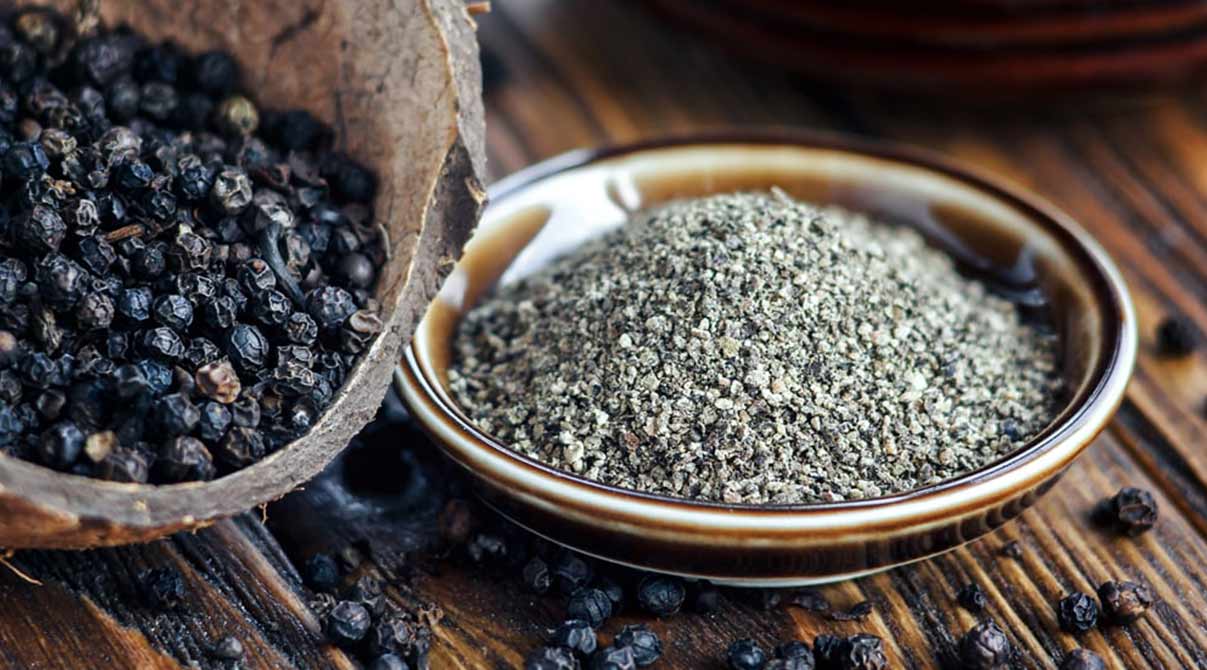
Black pepper is one of the most prevalent spices in Pakistani cuisine. Its flavor adds a unique depth and complexity to dishes, and chefs use it in almost every savory meal. Whether they combine it with other spices or serve it on its own, black pepper is essential for bringing out the full potential of traditional Pakistani flavors. With its rich history and long-standing reputation for spiciness, this spice has been part of the region’s cooking for centuries. Black pepper not only adds a delicious kick to food but also serves as a healing remedy for various ailments.
Most people prefer fresh black pepper over pre-ground powder due to its superior taste and aroma. You can find it whole in most supermarkets or grind it freshly from local spice shops to give your food that extra kick. With just a few shakes of this common condiment, you can transform ordinary ingredients into delicious dishes that are sure to tantalize your taste buds!
In Pakistan, people use black pepper in many different ways, depending on the dish they are preparing. From curries and stews to pickles and sauces, this dark-colored powder imparts an exquisite flavor that no other spice can match.
Health Benefits of Black Pepper
In addition to adding flavor, black pepper also has several health benefits. From aiding digestion to reducing inflammation and fighting free radicals, black pepper has a lot to offer when it comes to improving one’s health.
Filled with antioxidants and antibacterial properties, this spice can help reduce the risk of certain diseases such as cancer and heart disease. Furthermore, black pepper’s regular consumption improves circulation throughout the body owing to its high levels of vitamin C, iron, and other essential minerals. Also, its anti-inflammatory properties can help reduce pain from muscle aches or joint swelling caused by arthritis or other ailments.
3. Turmeric Powder
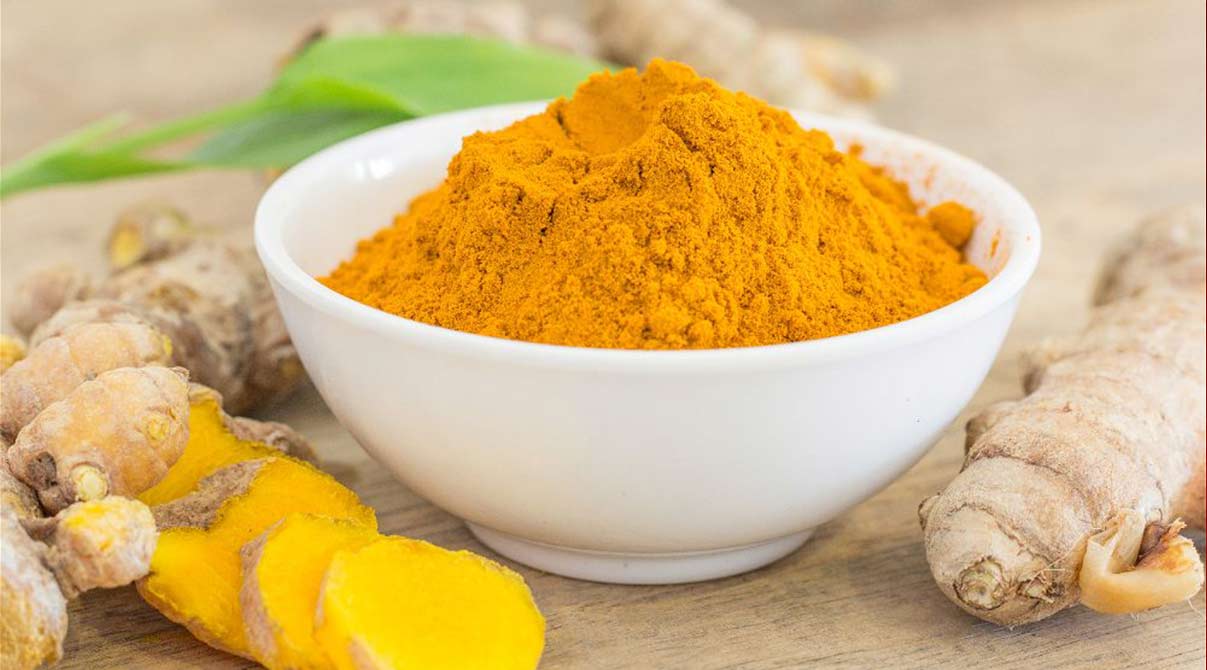
Turmeric powder is an essential ingredient for creating delicious and flavorful Pakistani dishes. This vibrant yellow powder has been a staple in Pakistan for centuries due to its unique flavor and health benefits. Besides adding flavor to the food, turmeric powder also serves as a natural coloring agent that brings out the vibrant colors of numerous Pakistani dishes.
Pakistanis often use turmeric while cooking rice, lentils, and vegetables. It helps to give many dishes their signature bright yellow hue and can add subtle notes of earthiness to them as well. Additionally, people sometimes mix turmeric with other spices like cumin and coriander to create a complex blend that enhances the flavor of curries, soups, stews, and even salads. The versatility of this spice makes it a staple in every Pakistani kitchen pantry.
The process of obtaining turmeric powder involves drying out the rhizome of the turmeric plant and then grinding it into a fine yellow-orange powder. It has an earthy aroma that adds depth to many dishes from curries to biryani.
Health Benefits of Turmeric Powder
Studies show that regular consumption of turmeric can help reduce inflammation, protect against chronic diseases and even boost brain function. It may also be beneficial for people suffering from digestive issues such as irritable bowel syndrome (IBS), as it helps to soothe inflammation in the gut lining and relieve symptoms. In addition to its anti-inflammatory effects, turmeric also contains antioxidants which help to improve overall health by fighting free radicals in our bodies.
4. Cumin (Zeera) Powder
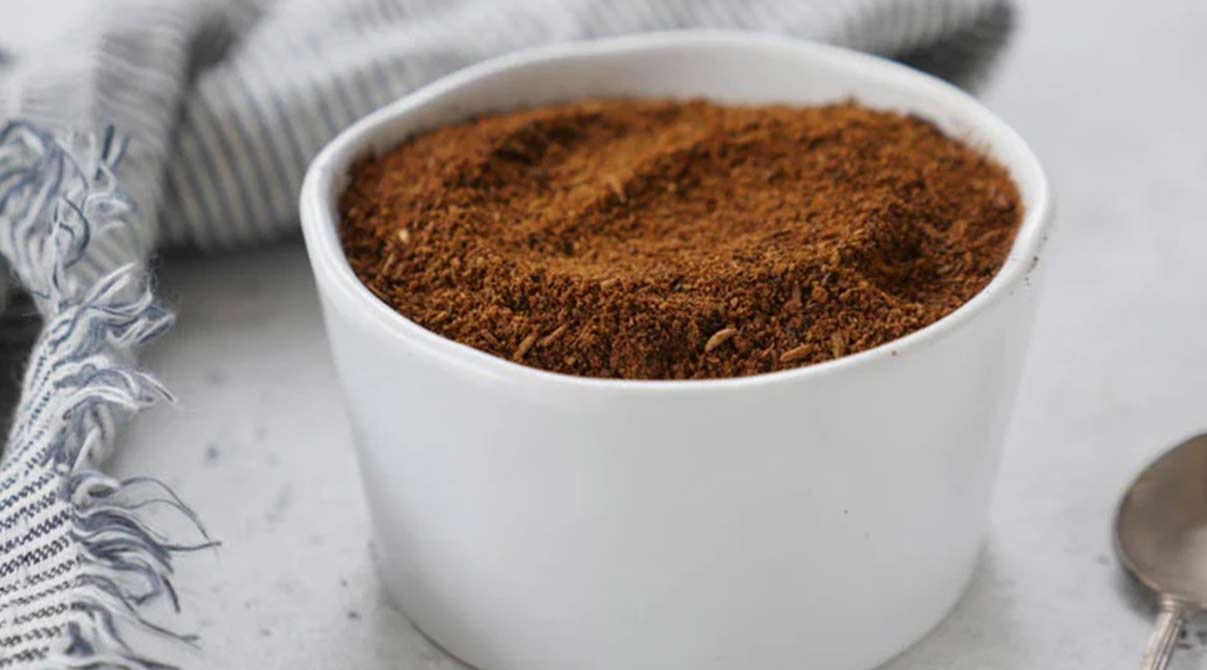
In Pakistan, cumin powder, also known as Zeera Powder, is a popular spice that people use to impart flavor and aroma to various dishes. Pakistani cooking incorporates it as an integral element, and many traditional recipes widely use it. South Asian cuisine has relied on cumin for centuries to add both flavor and nutrition to food. Cumin powder has an earthy, nutty flavor and aroma, which makes it a popular ingredient in curries, rice dishes, vegetables, kebabs, breads and many other recipes.
People usually roast the cumin before powdering it to infuse an intense flavor and aroma that non-roasted cumin seeds cannot achieve. In Pakistan, they often blend cumin powder with coriander powder, red chili flakes, and other spices like cardamom pods or garlic to create the classic “garam masala” blend. You can add this fragrant combination not only to curries but also to salads, pickles, chutneys, and more.
People typically add cumin powder toward the end of cooking to prevent prolonged cooking from causing the loss of its flavor. Moreover, you can sprinkle cumin as a topping on daal or boiled eggs to add extra flavor. It pairs well with coriander leaves for garnish on curries or other savory dishes.
Health Benefits of Cumin Powder
By regularly incorporating this powerful spice into your diet you can reduce inflammation, relieve digestive discomfort, boost immunity and energy levels and even promote weight loss. Cumin powder contains iron which helps increase red blood cell production in the body which supports healthy circulation. It is also high in vitamin E which is essential for healthy skin and hair growth. Additionally, the antioxidant properties found within cumin powder assist with detoxifying the body from harmful toxins collected over time from our environment or lifestyle choices.
5. Coriander
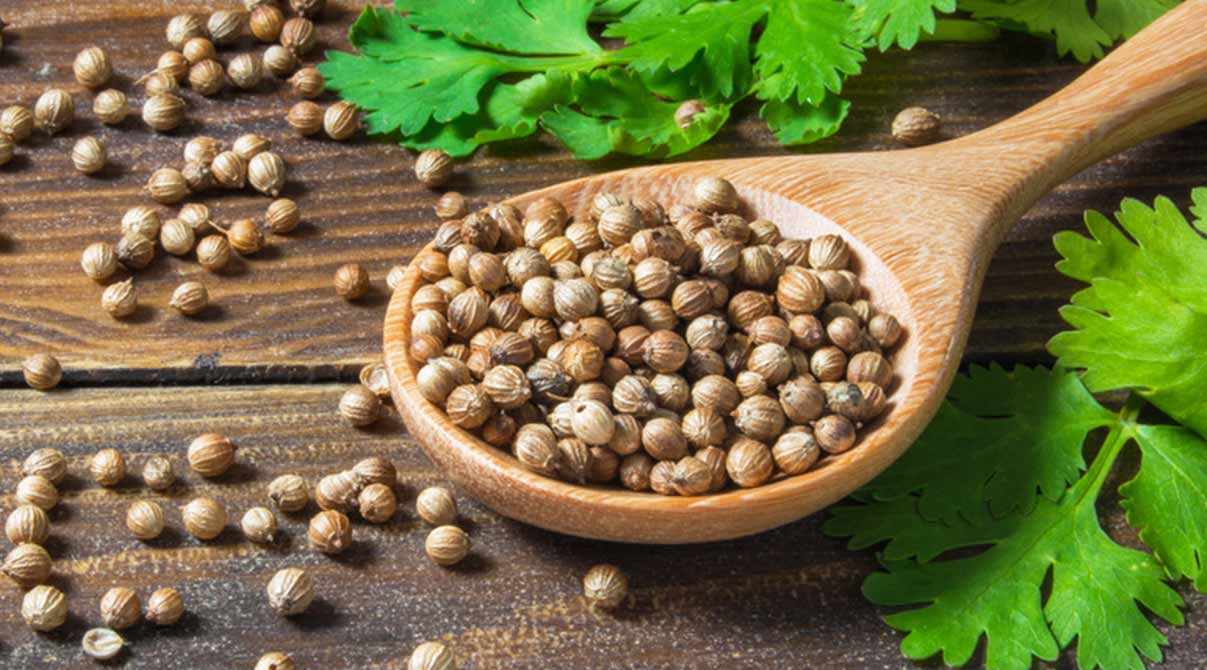
Coriander is another spice that has been used in Pakistani cooking for centuries. This aromatic spice adds a unique flavor to many traditional dishes and is an essential ingredient in Pakistani cuisine.
Locally known as dhania, people use the seeds of the Coriandrum sativum plant to make this widely-used spice. Both fresh leaves and dry seeds find use in various Pakistani recipes. When you grind it, it develops a warm and nutty taste with a hint of citrus. You can add it to curries, soups, stews, and sauces, or mix it into marinades for meat dishes. People also often sprinkle it over cooked foods as a garnish or include it in various chutneys. Coriander pairs well with cardamom, cumin, garlic, ginger, and turmeric—all popular ingredients in Pakistani food—to create complex flavors in dishes like biryani or daal makhani. This aromatic herb is present in almost every dish from curries to salads, and its use makes the food more interesting.
Health Benefits of Coriander
The name “coriander” comes from the Greek word for “bed bug,” referencing the scent of its leaves when crushed. People have used the plant since ancient times for culinary purposes, but it also possesses many medicinal properties, including antiseptic and antifungal effects. It can aid digestion, reduce inflammation, and enhance skin health due to its high levels of Vitamin C and antioxidants.
Coriander can help to reduce digestive issues such as bloating and gas. This is because the herb contains anti-inflammatory properties that can reduce inflammation in the gastrointestinal tract. Additionally, coriander is rich in dietary fiber, which helps to support regular digestion and prevents constipation. Furthermore, its strong antioxidant content helps to protect cells from damage caused by free radicals while boosting overall immunity.
Related: Order Your National Foods Products Online Through Made Easy Store
6. Garam Masala Powder
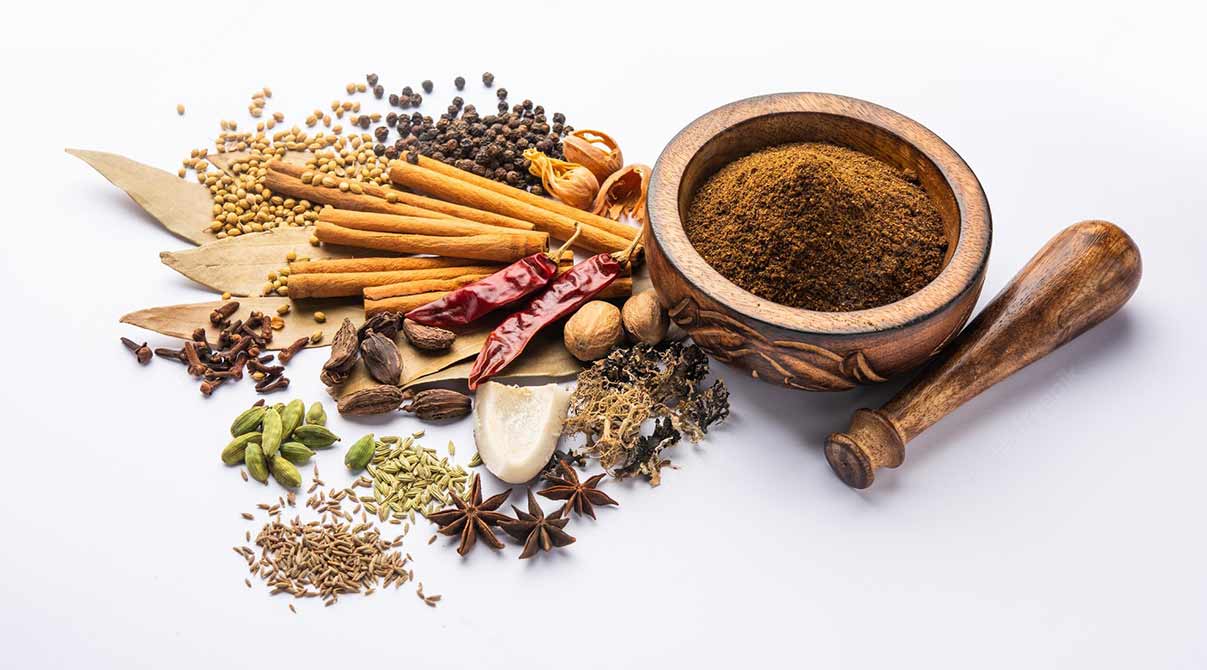
Garam Masala Powder is an essential ingredient in Pakistani cuisine. It’s a blend of spices that adds flavor and aroma to dishes, making them more complex and interesting. The combination of spices found in Garam Masala Powder varies from region to region in Pakistan, but the most common ingredients are cumin, coriander, cardamom, black pepper, cinnamon, nutmeg and cloves. These spices combine to create a unique flavor profile that people often use in savory dishes and sometimes in sweet recipes as well.
Centuries ago, chefs started using Garam Masala, and they continue to use it today all over the world. They widely use Garam Masala Powder to infuse flavor into curries and other dishes. It also helps bring out the natural flavors of vegetables without overpowering them. Pakistanis widely use it not only for cooking but also as a garnish or condiment on traditional dishes like biryani and curries. Additionally, they can combine it with yogurt or cream to make a marinade or sauce for grilled meats or seafood.
Health Benefits of Garam Masala
Research shows that garam masala can improve digestion, reduce inflammation, boost immunity, and more. The main components of garam masala – cumin, coriander, cinnamon, bay leaves, black pepper – have numerous health benefits. Cumin aids digestion by stimulating the production of saliva and gastric juices; coriander possesses anti-inflammatory properties; cinnamon helps to control blood sugar levels; bay leaves are rich in antioxidants; and black pepper can help fight colds and flu viruses. Garam masala also contains cardamom which may help to lower cholesterol levels.
7. Bay Leaves
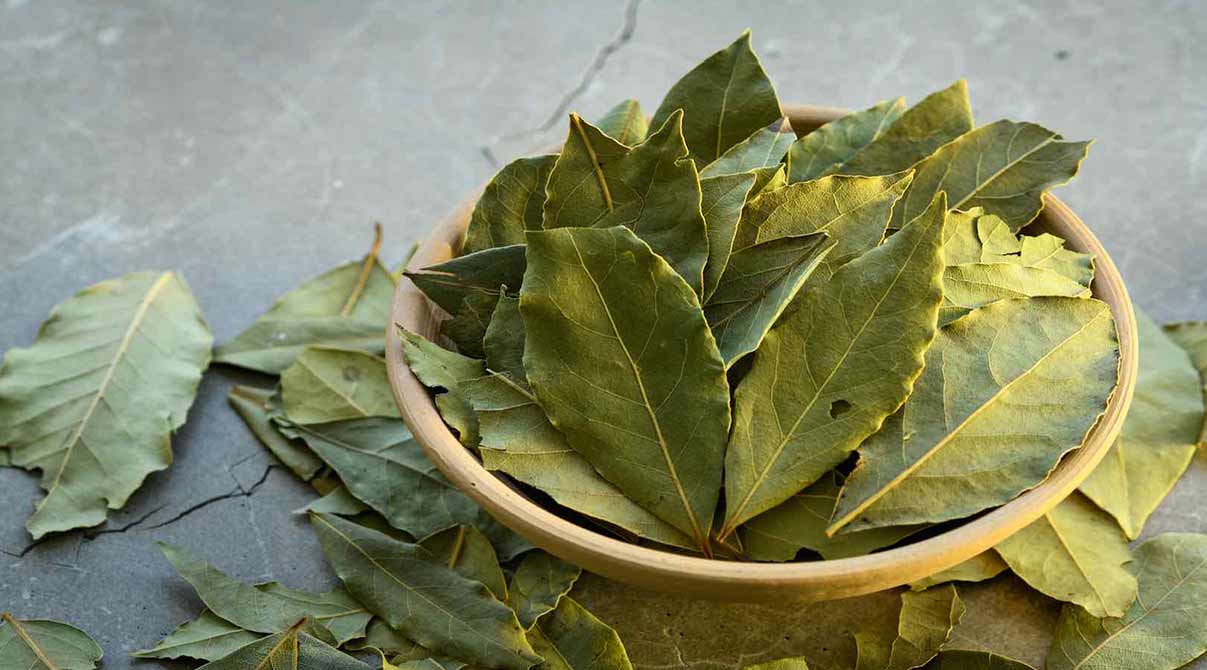
Bay leaves are an important spice in Pakistani cuisine. Often used as a flavoring agent, they lend flavor to a wide range of dishes including curries, dals, and marinades. Bay leaves have a delicate aroma that is both sweet and pungent at the same time and add robust flavor to any dish.
People have used the dried leaves of the bay laurel tree (Laurus nobilis) as a culinary herb since ancient times, with references dating back to Ancient Greek and Roman cookbooks. Most commonly, cooks add the fragrant bay leaf to curries, biryanis, kormas, dhals, soups, and stews.
In Pakistan, people often dry bay leaves in whole or ground form and use them for their rich taste and strong aroma. Cooks can add dried bay leaves early in the cooking process to allow the flavors to infuse into the food during simmering or boiling. Ground bay leaf is also useful for creating spice blends like garam masala, a crucial ingredient in many Pakistani recipes. Occasionally, fresh bay leaves become available seasonally, and chefs can use them raw in salads or cook them with vegetables to introduce an additional layer of flavor complexity.
Health Benefits of Bay Leaves
Bay leaves are an aromatic herb, having centuries-old applications in various forms of traditional medicine, including Ayurveda and Chinese herbalism. They contain a rich array of nutrients, including vitamins A, B6, and C, along with minerals like iron and potassium. In addition to being a flavorful culinary ingredient, bay leaves offer a wide array of health benefits.
The primary benefit of bay leaves is their antioxidant content. The antioxidants found in these leaves can help protect the body from free radical damage which can lead to inflammation and other chronic diseases. Bay leaves also contain compounds that have anti-inflammatory properties, making them beneficial for those with arthritis or other types of chronic pain. Additionally, these compounds may help lower cholesterol levels in the body and improve digestion by stimulating the production of digestive enzymes.
8. Cinnamon

Cinnamon, the fragrant and warming spice, is a beloved staple of Pakistani cuisine. With its sweet and slightly spicy flavor, cinnamon adds depth and complexity to the flavors of traditional Pakistani food from meat dishes to desserts. This versatile spice, used both as a condiment and an addition to dishes, has been a part of various recipes for centuries. The ancient Egyptians ground the cinnamon bark into a powder, and today, it comes in various forms, ranging from ground or grated powder to sticks of bark.
In Pakistan, people use cinnamon in traditional dishes such as biryani, pulav (pilaf), and kadu gosht – dishes that incorporate rice and cook them with spices, vegetables, or meat. People often serve these meals as a main course, and they enhance the flavor by generously sprinkling cinnamon on them. Besides using it in biryani-style dishes, you can also apply it as a dry rub on meats before cooking or include it in soups or stews to impart extra warmth and sweetness. It helps to balance out the flavors in these complex recipes which often use a heavy dose of spices like cumin and turmeric. You can also add cinnamon to hot beverages for an extra spicy kick or sprinkle it over desserts for a sweetness that lingers on your palate long after the meal has ended.
Health Benefits of Cinnamon
Cinnamon is known for its powerful antioxidant capabilities. It contains high levels of polyphenols which have been shown to protect cells from damage caused by environmental pollutants as well as free radicals that can cause chronic diseases such as heart disease and cancer. Additionally, cinnamon also contains anti-inflammatory properties, making it effective at reducing joint pain and aiding rheumatic conditions such as arthritis.
Related: Samosa – The Satisfying Pakistani Snack
9. Cardamom (Elaichi & Bari Elaichi)
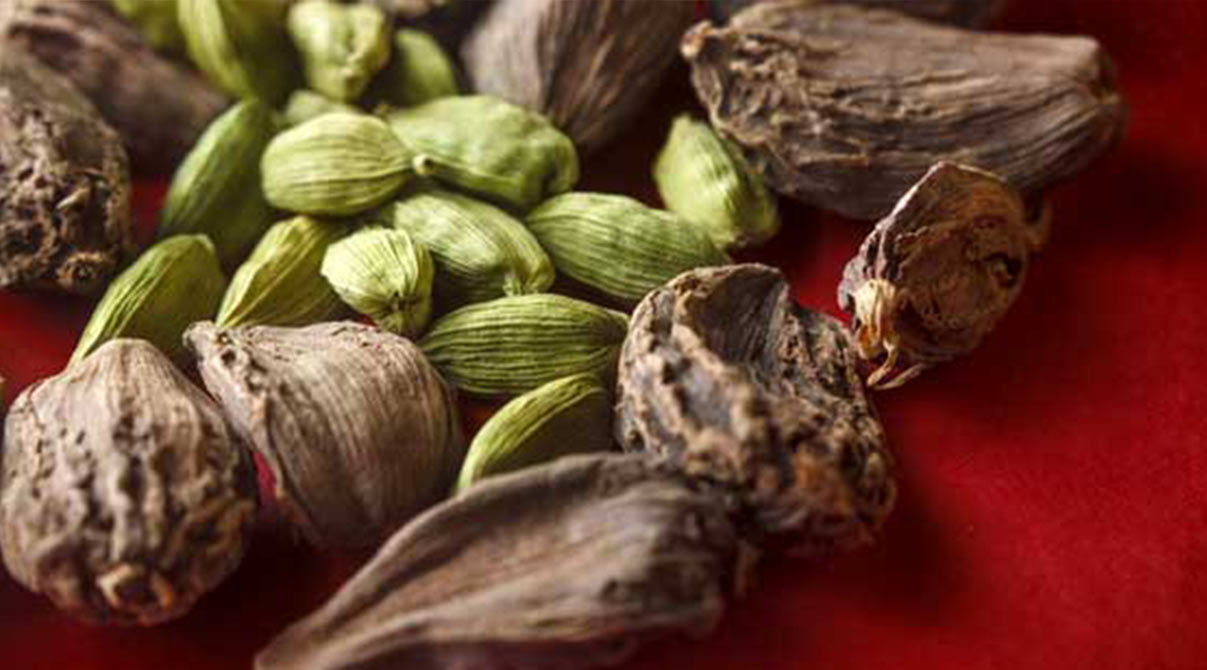
Cardamom, or elaichi as it is known in Pakistan, is an essential spice used throughout South Asian cuisine. It is a spice with a distinct and complex flavor that can be used in both sweet and savory dishes. It has been used for centuries in different types of cuisines all over the world. Cardamom has a slightly lemony citrus taste along with an underlying sweetness, making it an ideal ingredient for desserts as well as curries and other savory dishes.
This aromatic seed pod has been beloved for centuries for its many medicinal benefits and its subtle flavor. In Pakistani cooking, cardamom is used to add a unique flavor to both sweet and savory dishes alike. It can be found in everything from rich curries to fragrant desserts like kheer. Cardamom also plays an important role in the country’s traditional tea ceremony, where it acts as a natural stimulant that helps provide alertness during long conversations.
The aroma of cardamom alone can transport you straight into the heart of Pakistan’s vibrant culture and cuisine.
Health Benefits of Cardamom
This fragrant and sweet-tasting spice has been used for centuries by traditional healers to ease digestive issues and reduce inflammation. It can also help support the immune system and promote overall well-being.
Cardamom is rich in antioxidants that can fight off free radicals which can cause damage to cells and contribute to diseases like cancer or heart disease. Additionally, cardamom contains important vitamins and minerals like vitamin C, calcium, iron, magnesium, phosphorus, potassium and zinc that are essential for good health. The anti-inflammatory properties of this spice may also be beneficial in reducing pain due to inflammatory conditions like arthritis or joint pain.
10. Cloves
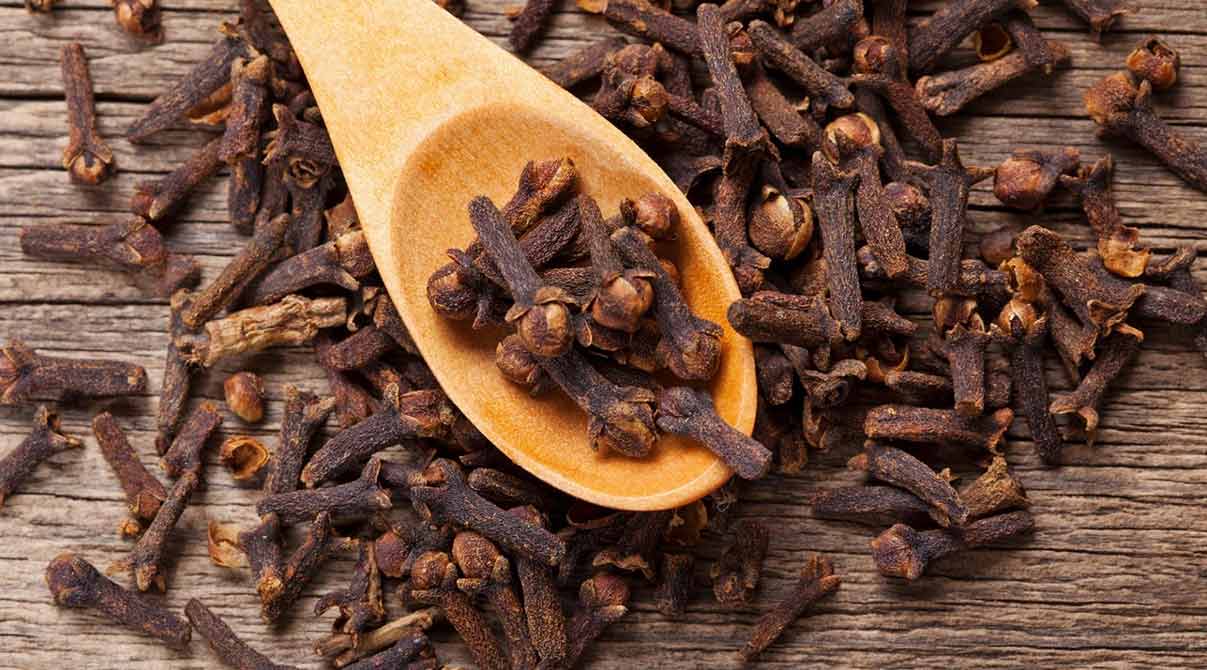
Cloves are another popular spice used in Pakistani cuisine. This aromatic and flavorful ingredient is often used to add depth of flavor to both sweet and savory dishes. Cloves have a distinct, pungent aroma that can be detected even before the cloves are ground or added to food. They have a sweet yet slightly bitter taste that gives Pakistani dishes a unique flavor.
The history of cloves dates back centuries, with ancient cooks using the fragrant spice to enhance the natural flavors of their meals. Not only do cloves add flavor but they also help to preserve food due to their antibacterial properties.
In Pakistan, cloves are widely used as an essential component of many different types of dishes including curries, biryani, nihari (a type of beef stew), qormas (a type of creamy curry) and other meat-based dishes. They can also be used to make fragrant desserts such as kheer (rice pudding). Cloves can also be added to drinks for extra flavor such as in masala chai (tea). Combined with other spices such as cardamom and cinnamon, cloves bring out the best flavors in any dish they are included in.
Cloves are one of the most important ingredients when it comes to creating traditional Pakistani dishes.
Health Benefits of Cloves
Cloves are loaded with antioxidants that fight cellular damage and protect against chronic diseases like cancer and heart disease. They also contain bioactive compounds that possess anti-inflammatory properties, which could help reduce inflammation associated with arthritis or other joint pain. Additionally, cloves contain eugenol which has antimicrobial properties that may help alleviate colds or other respiratory infections when consumed as a tea or tincture.
The Takeaway
In conclusion, Pakistani cuisine has a long list of spices that are essential for the flavors and aromas. These spices are an indispensable part of every kitchen and, when used in the right proportions, can turn an ordinary dish into extraordinary. They are an invaluable resource for creating delicious, authentic and memorable meals. From the nutty flavor of cumin to the sweet warmth of cardamom, these ingredients can be used to create a wide variety of dishes.
To get the most out of these must-have Pakistani spices, it is essential to understand their individual flavors and how they can work together to create delicious dishes. Cooking experts have shared their favorite Pakistani spices to guide us in perfecting our recipes. For those who have never cooked with these spices before, it is highly recommended that they give them a try.